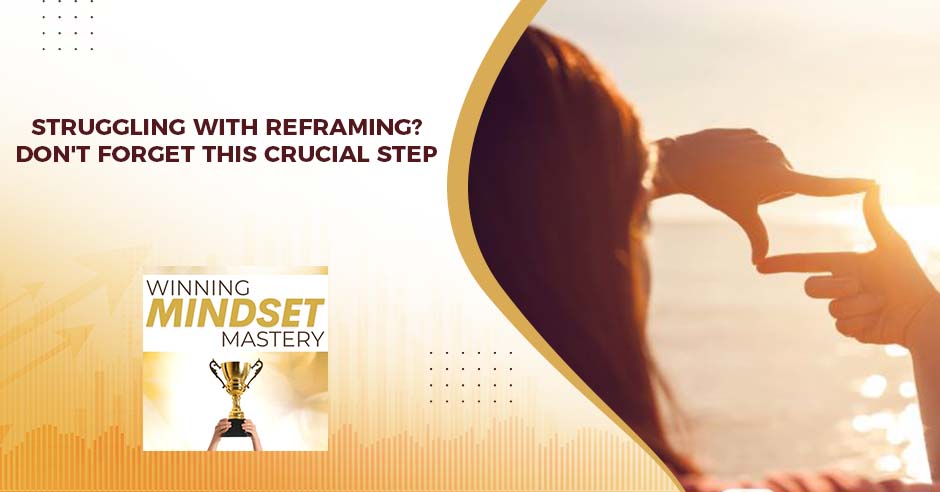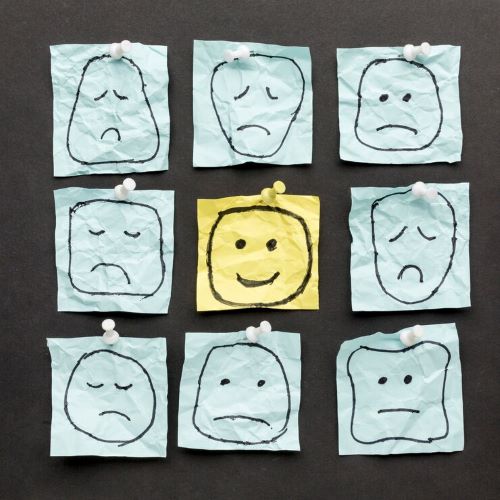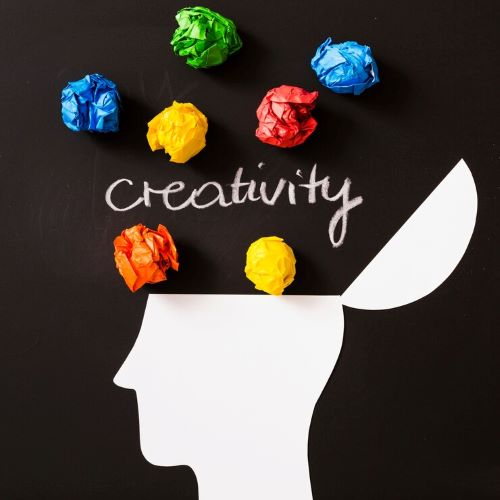
Embracing emotions isn’t a weakness—it’s the pivot point to reframing challenges into opportunities. In this episode, we discuss the often-overlooked step in the art of reframing, a crucial element that can transform your mindset and approach to challenges. We bring to light the power of acknowledging and experiencing emotions as the vital precursor to effective reframing. Tune in now and learn how to honor your emotions and start the real journey of reframing.
—
Listen to the podcast here
Struggling With Reframing? Don’t Forget This Crucial Step
I am so glad you’re here. We talk about reframes at least once a month, sometimes a couple of times a month. The reason is that it is right up there with those most important mindset practices to get you that winning mindset. When we know how to look at things in a way that we know they’re happening for us instead of to us, it changes how we feel about every single thing in the world. What about when you are following the reframing process? You are checking where your oven is.
Are you too upset about this? Do you need to walk away? Are you at a point where you can objectively try and reframe, asking yourself what new information would help you feel better or what experience from the past can you think about that would help you address this situation and feel better about it? What advice that you could give a friend or a child if they were in this situation would help you feel better?
You have gone through steps, 1, 2, 3, and you still feel completely unable to reframe a situation. Maybe you’ve done it a couple of times and you don’t know why it’s not working for you. This isn’t something where you can just go for a walk, come back, and have it work for you. You may be in one of those situations where the thing that has happened is big enough that you need to take a step, take time, and acknowledge and experience your feelings around this.
You might say, “Why don’t I have to do it around the other reframes that we’re doing?” In the other reframes, you’re usually experiencing something you’ve experienced before in some way, shape, or form. You’re familiar with the feelings and how big it is. It might be a minor annoyance. It might be the fact that a friend canceled last minute for lunch. It might be news that you got that you weren’t expecting, but it’s not a bigger loss. Those things that we encounter that feel like a bigger loss do have to be both acknowledged and experienced.
You can experience the feelings and then acknowledge what’s happening, or you could acknowledge it and then experience what’s happening. It depends on how self-aware you are about your feelings and the way that things go. You need to do both of those to be able to get into the place to be able to reframe. Let’s talk about a big loss. That could be a competition that you lost. You thought you would win it and you didn’t. Maybe it’s a local election, a promotion, a sporting event, or a relationship that you lost, or you found out there’s a health issue that you have, a disease. Perhaps you unexpectedly got injured.

You can experience the feelings and then acknowledge what’s happening, or you could acknowledge it and then experience what’s happening.
Let’s take a health issue for example. My macro coach is a super healthy and fit person, but she also lives for cheese and chocolate. She’s super healthy and eats well but finds a way to incorporate those things in her diet every single day. If her doctor said, “You have a dairy allergy and you can’t have dairy anymore,” that would be a big thing for her because it’s a big part of her life. She would need to take the time to acknowledge and experience how she felt about that. There would be a sense of loss.
You have to sit with those feelings and acknowledge that this is something that’s going to change your life that may be challenging to adapt to at first and feel those feelings of sadness, grief, or whatever comes up for you. For some people, this is going to take minutes. For other people, it’s going to take hours, days, weeks, or months. It depends on the type of loss, and how big the loss is, and it’s different for everyone.

You have to sit with those feelings and acknowledge that this is something that’s going to change your life.
One of the things that we often get in the trap of doing is judging someone else’s pain. Depending on what kind of pain and challenge you’ve experienced in your life, something that someone else experiences is either going to seem huge to you or it’s going to seem small on your scale. Understand that the way that each of us experiences things is unique and allowed, and it’s okay. It is so important to the reframing process because if you don’t feel those feelings, what you’re going to be doing when you reframe is just trying to push those feelings away from you and you won’t get to that better feeling place. You won’t get to where your mindset is working for you because you’re just pushing up against it.
One of the things that we often get in the trap of doing is judging someone else's pain. Share on XIf you let yourself feel those feelings, however long it takes, you’re acknowledging them, and you’re experiencing them, they’re going to pass more quickly than they would if you kept pushing up against them and then, at some point, they overcome you. We have all seen this happen. We have all had that friend who was trying to avoid something and feeling it and dealing with it. When it finally happened, and maybe we were that friend, it was overwhelming and much bigger than it had to be. Taking the time to do this can be a positive thing for you. Also, once you feel it, that reframe becomes so much easier because instead of pushing away from a thing that we didn’t want to acknowledge or feel, we’re looking for things that we want to acknowledge about it.
Going back to this dairy example, she likes to cook and try new recipes. It’s going to be exciting to try and find new ways to enjoy the food that she likes to eat without dairy. Maybe she’s just going to be excited to find out that there are more non-dairy alternatives than she ever imagined, and it’s not as hard as she thought it would be. She might find that without dairy, she has much less inflammation in her body. She becomes an even better athlete and she recovers faster, and all these things that make the dairy allergy and finding out about it feel like it was something that happened for her, not to her.

The bigger the item feels to you, the bigger the loss and the more important it is to acknowledge and experience those feelings to help you accept what’s happening and go through that reframing process.
Keep in mind, the bigger the item feels to you, the bigger the loss and the more important it is to acknowledge and experience those feelings to help you accept what’s happening and go through that reframing process. The best part is you’ll be adding to that reservoir of things that you can pull from in the past that make you feel better about new challenges that you encounter. Remember, if those reframes are a struggle, then go back to that feeling step. Take the time that you need with it and it will make all the difference. Here’s to your success.





